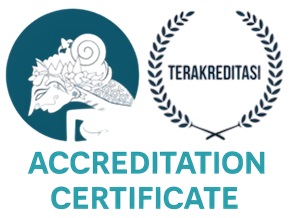Kesatuan Semu pada Tindak Tutur Ekspresif Marah dalam Bahasa Indonesia
Abstract
Anger is a verbal behavior that is included in the study of language pragmatics, specifically expressive speech acts. Verbal anger is an expressive speech act, expressive speech acts support the international language function which expresses the relationship between international language functions using social relationships and personal attitudes. The language function supported by expressive speech acts is international, which is used to obtain verbal anger patterns in terms of expression speech acts in Indonesian. The function of pseudo unity is also to maintain social relations between friends, family, and society. This anger speech act can be done through indirect sentences with an explicit meaning and focus on the second party. This is also done through direct sentences and meanings with or without a response from the second party. The method used in this research is descriptive qualitative.
Downloads
Copyright (c) 2022 Jauhara Jilan Situmorang, Liyundzira Hikroh Gani, Edi Syaputra

This work is licensed under a Creative Commons Attribution-ShareAlike 4.0 International License.











